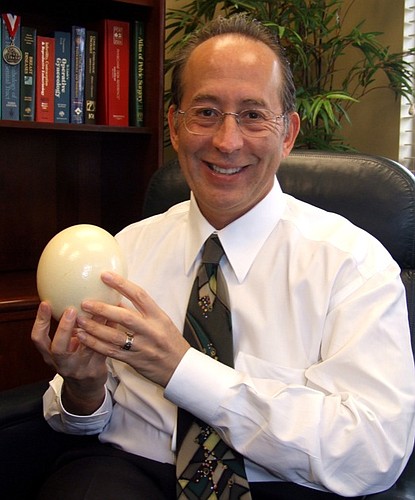- November 24, 2024
-
-
Loading

Loading

Craig Sweet is about to fly to California, where he'll be manning a booth at the Pacific Coast Reproductive Society's annual gathering.
The Fort Myers reproductive endocrinologist concedes he's a little anxious. “I've never done a trade show,” he says.
Sweet is promoting his recently launched Embryo Donation International, a division of his practice, Specialists in Reproductive Medicine & Surgery. He's gathering human embryos that have been abandoned by couples who have undergone in vitro fertilization, a process by which a woman's egg is fertilized by sperm outside the body and then planted into the uterus for pregnancy.
The idea came to him when he puzzled over what to do with the 120 embryos that couples have abandoned at his own practice. They're frozen and stored in liquid nitrogen inside special containers at his office in Fort Myers. “I don't own them,” he says.
Typically, Sweet removes and fertilizes more eggs from a woman in case they're needed later if the in vitro fertilization process isn't successful at first. “Now I have 120 abandoned embryos,” he gripes. “The market crashed; people just left.”
It costs $300 a year to store embryos, so Sweet has hired private investigators to track down the embryos' missing owners. In 2001, he started giving people the choice of donating the stored embryos. Because you can't buy and sell embryos, Sweet agrees to waive storage fees and make a contribution to a charitable organization in return.
But it was only in recent years that Sweet realized there was a business opportunity using donated embryos. It costs about $14,000 for in vitro fertilization, but patients can cut that cost in half if they use donated embryos. “The downturn was a motivator to ratchet that up,” Sweet explains.
Sweet declines to share his practice's revenues, but he says his clinic performed about 100 in vitro fertilizations using “fresh, not frozen” embryos during the good years, but that number fell to 60 during the economic downturn before coming back recently to about 80.
Sweet has been using frozen donated embryos since 2001, but the business has picked up in recent years because of the greater affordability. In the last 15 months Sweet says he's performed 31 in vitro fertilizations using donated embryos, about one every two weeks.
Because of the reach of the Internet, Sweet believes he can perform more in vitro fertilizations using frozen donated embryos because he says people will travel to save on the cost. He says his closest competitor is located in Tennessee. “I was Skyping today with people in Germany and Texas,” he says.
Using his website, Embryodonation.com, patients can click on a button to search Sweet's database of embryos based on factors such as the donor's race and education and the patient's preferences for those same characteristics. The function also allows you to save your searches in a “favorites” folder and notify you when new embryos arrive.
For less than $10,000, Sweet says he can provide in vitro fertilizations using frozen donated embryos and offer travel accommodations in Fort Myers. Within two years, Sweet estimates his practice could sell as many as 120 in vitro fertilization “vacations” using donated embryos. A “med vacation” button steers patients on his website to book their stay in Fort Myers, including suggestions for overnight trips to Miami, Tampa and Orlando.
To generate Web traffic, Sweet writes blogs, tweets and updates his site regularly. “We really live and breathe through the Internet,” he says.
But if his forecasts prove accurate, Sweet will run out of abandoned embryos fast. So Sweet is attending trade shows, such as the one in California, and he's contacting other fertility doctors directly to collect frozen abandoned embryos so he can replenish his stock. By one estimate in 2003, there were at least 400,000 frozen human embryos in the U.S.
“I found a niche,” Sweet says.